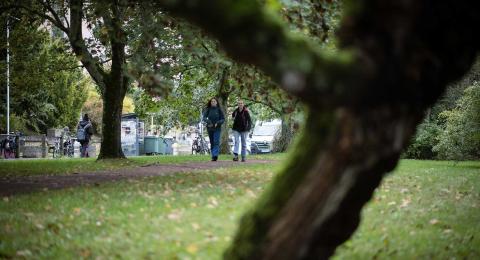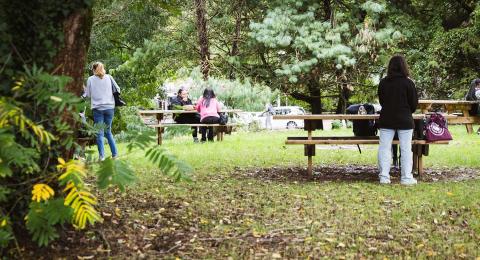Agrosciences, Environment, Territory, Landscape, Forest
The Agrosciences, Environment, Territories, Landscape and Forest (AETPF) major deals with the sustainable management of resources and environments in territories in a multi-disciplinary way, taking into account the issues of sustainable agriculture, agroecology and environmental protection.
The AETPF major comprises one M1 and five M2s.
The first year of the Master's programme tackles the problems associated with agriculture and the environment, and provides the general disciplinary foundations for dealing with them, in the ecological, biotechnical and social sciences. It provides the common foundations needed for an integrative vision prior to the second year of the Master's programme, when the various specialisations will go into greater depth in more specific or deliberately interdisciplinary areas.
The M2s in the AETPF major are :
M2 Agroecology, Knowledge, Territories and Society (M2 ACTES)
M2 From Agronomy to Agroecology (M2 AAE)
M2 Climate, Land Use and Ecosystem Services (M2 CLUES) (M2 in English)
M2 Soil Management and Ecosystem Services (M2 GSSE)
M2 Landscape Project Theory and Approach (M2 TDPP)
Information
Master’s Year 1
Master’s Year 2
Professional skills :
- Ability to take an integrative view of environmental and agricultural issues, a view that is both multi-disciplinary and multi-scale, and that focuses on processes that may be biological, chemical or physical.
- Ability to define and analyse complex agricultural, forestry and ecological systems using modelling combined with other research methods (experimentations, surveys)
- Ability to mobilise sufficient academic knowledge to interact in a project in the fields of management of natural, agricultural and peri-urban areas and management of natural resources.
- Ability to define the scope of an issue for a given environmental or agricultural problem and to develop appropriate solutions.
Cross-curricular and linguistic skills
- Working independently: setting priorities, managing time, self-evaluation, developing a project.
- Use information and communication technologies.
- Develop skills in documentary and investigative research, and in interpreting documents through oral, graphic and written expression.
- Implement a project: define the objectives and context, carry out and evaluate the action.
- Carry out a scientific study: pose a problem; construct and develop a rigorous argument; justify a methodological approach; interpret the results; draw up a summary; propose prospects.
- Be able to report on a research activity by mastering the rules of scientific writing.
Interpersonal skills:
- Written and verbal communication in French and English. Be clear, get your ideas across by mastering communication tools.
- Working in a team : fitting in, positioning yourself, cooperating, leading, etc.
- Integrating into a professional environment
This qualification is registered in the Répertoire National des Certifications Professionnelles (RNCP) under RNCP code 39496.
Learning outcome targets
The aim of the Agrosciences, Environment, Territories, Landscape and Forest (AETPF) major is to train specialists with a high level of scientific skills in the management of natural and agricultural areas and the management of natural resources in rural and peri-urban areas. The course emphasises an integrative vision that is both multidisciplinary and multi-scale. The aim is to train students to take an interest in the interactions between agricultural production, environmental protection, land management and global change.
The course places great emphasis on methodological approaches: modelling, its theoretical, mathematical and statistical foundations, as well as experimentation, field observations, surveys and participatory research, all of which combine to provide a better understanding of complex agricultural, forestry and ecological systems.
Students are trained to use the appropriate scientific approaches to help tackle the major problems of today and tomorrow, whether ecological (e.g. maintaining biodiversity), agricultural (e.g. the agroecological transition) or linked to the preservation of resources (e.g. the soil quality) and environments (e.g. global climate changes). In addition, the AETPF course places particular importance on students' autonomy and capacity for self-learning. For this reason, a significant part of the course is devoted to project-based teaching (individual or collective), and internships.
Target audience
The M1 AETPF is mainly open to holders of a bachelor's degree (or equivalent) in environmental sciences, agronomy, ecology, biology or geology. It can also be taken by students with a degree in geography or political science who are interested in the economic and social dimensions of the management of natural, agricultural and peri-urban areas, or the management of natural resources, and who are prepared to understand the physical, mathematical and biological bases involved. Students must have a sufficient level of French to follow the courses (except for CLUES, which is taught in English). Each M2 has its own prerequisites.
M2 ACTES: Master 1 in social sciences with an interest in food issues and the development of agroecology, Master 1 in biology, ecology, agronomy and open-mindedness towards the social sciences, second year of engineering school; Ability to read social science literature and acquire a different way of thinking from one's original training.
M2 AAE: Master 1 AETPF, Master 1 biology, Master 1 ecology; second year of engineering school. Open to students from geography, social sciences, political sciences, depending on their motivation, career plans and previous experience. Some knowledge of statistics and a sufficient level of English to follow a module in English.
M2 CLUES (M2 in English) is aimed at students with a background in one of the following disciplines or scientific areas: Ecology, Applied Physics or Environmental Biophysics, Functioning of the Biosphere, including agronomy or land use planning. Students with a background in the social sciences and humanities may also be eligible, provided that they have been exposed to the above-mentioned scientific fields as part of their study programme or their extracurricular or professional experience.
M2 GSSE is open to students with an M1 in Earth, Environmental and Agronomy Sciences (in particular AETPF and STEPE, and engineering courses in agronomy, earth sciences or general engineering). Students must have taken a 30-hour module on soil in their previous course.
M2 TDPP: M1 students from a variety of courses and disciplines (geography, urban planning, philosophy, sociology, ecology, agronomy, architecture, landscape, etc.) wishing to deepen their knowledge of landscape and projects. A good general knowledge is essential, as is an aptitude for cross-disciplinary and multidisciplinary approaches.










